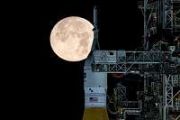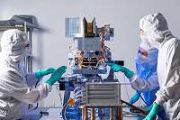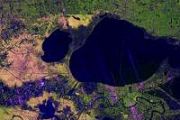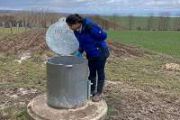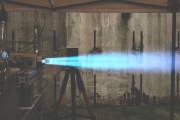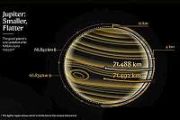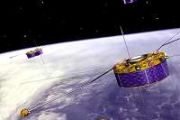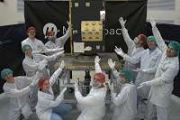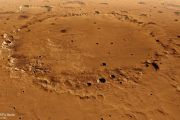
Copernical Team
Galileo: the journey of satellites 33 and 34
 Video:
00:05:30
Video:
00:05:30
On 17 December 2025, two new Galileo satellites lifted off from Europe’s Spaceport in French Guiana. This was the 14th launch for Europe’s satellite navigation operational satellite programme, reinforcing Europe’s resilience and autonomy. The flight, VA266, was the first launch of Galileo satellites on Europe’s newest heavy-lift launcher Ariane 6.
The satellites, designated SAT 33 and SAT 34, separated from the launcher after a flight of just under four hours. The launch was declared successful after acquisition of signal and the confirmation that both satellites are healthy with their solar arrays deployed.
“With these new satellites, we strengthen Europe’s global navigation
XRISM sees comet 3I/ATLAS in X-ray light
 Image:
XRISM sees comet 3I/ATLAS in X-ray light
Image:
XRISM sees comet 3I/ATLAS in X-ray light Introducing ARIEL, a new 250 N thruster

LizzieSat 3 completes bus commissioning for multi mission AI operations
 Sidus Space has completed bus-level commissioning of its LizzieSat-3 spacecraft, confirming that the satellite's core systems are operational in orbit and ready to support customer missions. LS-3 is part of the company's LizzieSat multi-mission constellation focused on providing space-based data services, integrated sensors, and autonomous on-orbit computing capabilities to government and commer
Sidus Space has completed bus-level commissioning of its LizzieSat-3 spacecraft, confirming that the satellite's core systems are operational in orbit and ready to support customer missions. LS-3 is part of the company's LizzieSat multi-mission constellation focused on providing space-based data services, integrated sensors, and autonomous on-orbit computing capabilities to government and commer NASA backs CINEMA smallsat fleet to probe Earth magnetotail
 NASA has selected Dartmouth College and the Johns Hopkins Applied Physics Laboratory (APL) in Laurel, Maryland, to begin developing a mission that will shed more light on the growing impacts of space weather.
The Cross-scale Investigation of Earths Magnetotail and Aurora (CINEMA) mission will unlock the secrets of the energy circulation through Earths magnetotail. The magnetotail is an ext
NASA has selected Dartmouth College and the Johns Hopkins Applied Physics Laboratory (APL) in Laurel, Maryland, to begin developing a mission that will shed more light on the growing impacts of space weather.
The Cross-scale Investigation of Earths Magnetotail and Aurora (CINEMA) mission will unlock the secrets of the energy circulation through Earths magnetotail. The magnetotail is an ext New NASA Sensor Goes Hunting for Critical Minerals
 Cradled in the nose of a high-altitude research airplane, a new NASA sensor has taken to the skies to help geoscientists map rocks hosting lithium and other critical minerals on Earth's surface some 60,000 feet below. In collaboration with the U.S. Geological Survey (USGS), the flights are part of the largest airborne campaign of its kind in the country's history.
But that's just one of ma
Cradled in the nose of a high-altitude research airplane, a new NASA sensor has taken to the skies to help geoscientists map rocks hosting lithium and other critical minerals on Earth's surface some 60,000 feet below. In collaboration with the U.S. Geological Survey (USGS), the flights are part of the largest airborne campaign of its kind in the country's history.
But that's just one of ma Laser experiment proposed to probe quantum nature of gravity
 Researchers at Helmholtz-Zentrum Dresden-Rossendorf have outlined an experiment in which light exchanges discrete packets of energy with gravitational waves, potentially revealing the long-sought quantum properties of gravity. In the proposed scheme, a laser beam interacts with a passing gravitational wave so that the light loses or gains an energy amount corresponding to one or more gravitons,
Researchers at Helmholtz-Zentrum Dresden-Rossendorf have outlined an experiment in which light exchanges discrete packets of energy with gravitational waves, potentially revealing the long-sought quantum properties of gravity. In the proposed scheme, a laser beam interacts with a passing gravitational wave so that the light loses or gains an energy amount corresponding to one or more gravitons, Sentinel 6B begins sea level mapping campaign
 Sentinel-6B has begun returning its first ocean measurements, providing initial maps of sea level across a wide area of the U.S. East Coast and the Atlantic Ocean after its November launch. The U.S.-European mission is designed to survey about 90 percent of Earth's oceans using high-precision radar altimetry to track changes in sea surface height that affect coastal communities and marine operat
Sentinel-6B has begun returning its first ocean measurements, providing initial maps of sea level across a wide area of the U.S. East Coast and the Atlantic Ocean after its November launch. The U.S.-European mission is designed to survey about 90 percent of Earth's oceans using high-precision radar altimetry to track changes in sea surface height that affect coastal communities and marine operat "Robot, make me a chair" robot-make-me-a-chair-in-six-prompts
 Computer-aided design (CAD) systems are tried-and-true tools used to design many of the physical objects we use each day. But CAD software requires extensive expertise to master, and many tools incorporate such a high level of detail they don't lend themselves to brainstorming or rapid prototyping.
In an effort to make design faster and more accessible for non-experts, researchers from MIT
Computer-aided design (CAD) systems are tried-and-true tools used to design many of the physical objects we use each day. But CAD software requires extensive expertise to master, and many tools incorporate such a high level of detail they don't lend themselves to brainstorming or rapid prototyping.
In an effort to make design faster and more accessible for non-experts, researchers from MIT BlackSky accelerates Gen-3 satellite into full commercial service in three weeks
 BlackSky Technology Inc. (NYSE: BKSY) has placed its third Gen-3 imaging satellite into commercial service just three weeks after launch, marking a major reduction in commissioning time compared with the company's first Gen-3 unit. The new spacecraft adds further capacity for 35-centimeter-class very high-resolution imagery and AI-enabled analytics for BlackSky customers worldwide.
"Integr
BlackSky Technology Inc. (NYSE: BKSY) has placed its third Gen-3 imaging satellite into commercial service just three weeks after launch, marking a major reduction in commissioning time compared with the company's first Gen-3 unit. The new spacecraft adds further capacity for 35-centimeter-class very high-resolution imagery and AI-enabled analytics for BlackSky customers worldwide.
"Integr 
